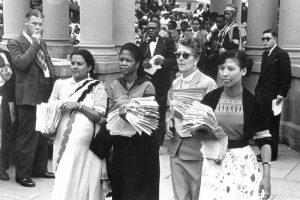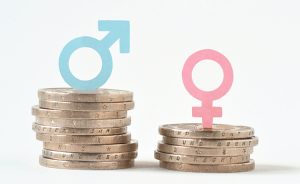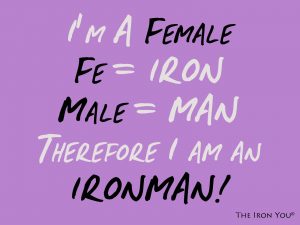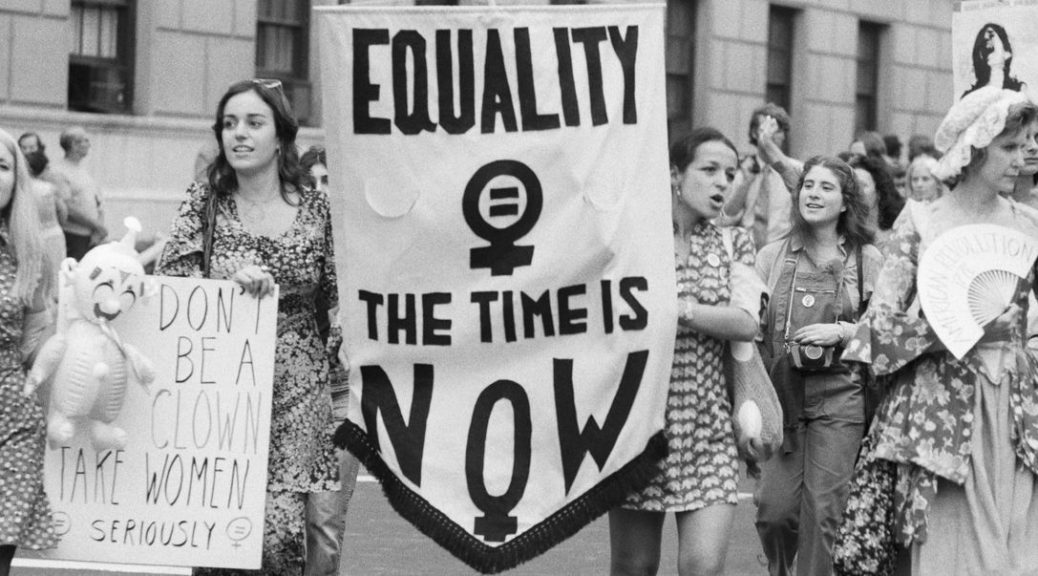‘Wathint’ Abafazi, Wathint’ Imbokodo’

As a South African woman, I am well aware of the sacrifices made by the likes of Lilian Ngoyi, Rahima Moosa, Helen Joseph and Sophia Williams-De Bruyn. On the 9th of August 1956, these courageous individuals, as part of a +20,000 crowd of women, marched to the Union Buildings in Pretoria, South Africa’s capital, to hand over a petition demanding freedom from the oppressive pass laws.
Prior to 1956, all black men in South Africa were required to carry passes to move freely in urban areas. These passes were only allocated to men who had jobs and were a means of controlling the influx of black people into urban areas. In 1952, the apartheid government announced that black women would also be required to carry such passes, and this was met with grave resistance. Thus, leading to the infamous march on the 9th of August, where they petitioned against the new pass laws and Group Areas Act that would further entrench racism into the fabric of South African culture. Despite the lack of immediate change occurring with regards to the laws, this march served as a pinnacle for the resistance struggle against pass laws which were ultimately absolved in 1986.
At a time when South Africa was divided under the apartheid law, these women put aside any racial, cultural and political differences that may have existed between them, and banded together to challenge the government, with the sole intention of improving the lives of women for generations to come.
‘Wathint’ Abafazi, Wathint’ Imbokodo’
“You strike a woman; you strike a rock.” Now regarded as a South African proverb, these words are taken from the famous resistance song composed for the 1956 protest. It now symbolizes the strength and courage that women possessed at the time (under apartheid law) and continue to possess to this very day, decades after their initial opposition to a government that had blatantly oppressed them.
It’s been 64 years since that momentous day, and at the close of women’s month (August) in South Africa, I am left wondering whether or not the significance of the day has been lost, and if the day is simply regarded as “just another public holiday.”
Our current dilemma
There is no doubt that being a woman in the workplace is difficult. Sure, some fields may be more “accepting” of women than others, but it always feels as though you have to fight 10 times harder than any man in the very same position as you. Microaggressions in the workplace make working environments very difficult for women, and when attempting to speak out, they are sometimes labelled as ”aggressive”, “bossy”, “not a team player” or even “unmanageable”. The unfortunate truth is that the glass ceiling seems far too close for most women. Men don’t face the same issues that women do. Men rarely have to choose between their career and having a family.. Men aren’t really expected to work and still excel in housework. No one would bat an eye if a man consistently overworked and thus failing to be truly present for his family.

Realizations
So what?! So what if they call you bossy? So what if you are told that you are too career orientated? So what if you are the only woman in an entire boardroom? You are exactly where you need to be to make a difference! Own your position, be bold, bossy and assertive … but remember that you are unique in your own way, and you are dealing with things men will NEVER EVER understand.
Don’t get me wrong, I’m not saying that we should treat men with the same kind of condescending, passive aggressive nature that they sometimes show us. On the contrary, I think it’s better if we own the things that set us apart. Women are always said to be more emotionally intuitive, highly analytical and driven to make decisions that benefit the collective. So perhaps instead of fighting to fit into spaces currently occupied by men, we should capitalize on our feminine characteristics and create our own spaces with that unique and powerful female touch. Then set down the ladder to allow other women to follow suit. If we truly collaborate as women, building each other up, I believe we would be able to conquer so much more!
“If you educate a man you educate an individual but if you educate a woman you educate a family (nation)” – James Emman Kwegyir Aggrey
For many women, it may seem like the idea of “having it all” is simply impossible. We are often presented with a false choice, told to choose between having a successful career or a stable family, because the option of flourishing in both areas simultaneously is deemed unrealistic and absurd. As a result – in certain situations – it may feel like our ability to bear children is actually an obligation, rather than a gift. So much value is given to bearing children, that in a lot of cultures, a woman is regarded as less than, if she is unable to bear children. On the other hand, a woman who actively chooses not to have children will never hear the end of it. Just ask Tracee Ellis Ross.
You are a woman, and that is your superpower. Never let anyone tell you otherwise! Fight for your rights at every turn but remember to protect your peace.
————————————————————————————-
Below is a list of 20 influential women across varying sectors, including some of my own personal role models. I hope that this list will inspire you to break through that glass ceiling and exist loudly, and proudly in whatever sector you find yourself in!
————————————————————————————-

- Ellen DeGeneres
Area of influence: Entertainment
According to a poll by Variety magazine in 2015, Ellen DeGeneres did more to influence American attitudes in regard to gay rights than any other celebrity. The talk show host came out as gay in 1997 — and so did her character on her sitcom “Ellen.”
- Ai-jen Poo
Area of influence: Activism
Ai-jen Poo was a driving force behind the worker-led movement Domestic Workers United in New York City. The organization’s campaigns led to better conditions for domestic workers, raised awareness of economic contributions that domestic workers provide, helped get legal representation for abused workers, and crafted a framework of legal standards for workers.
- Malala Yousafzai
Area of influence: Women’s rights
Malala Yousafzai, an advocate for women’s education rights, won the Nobel Peace Prize at age 17, making her the youngest recipient ever. The attempt on her life when she was on her way to school led to her native Pakistan to pass that nation’s first Right to Education Bill.
- Oprah Winfrey
Area of influence: Entertainment/activism
Oprah Winfrey, the first African-American female billionaire, has had a significant influence on American culture since her time as a television talk show host. She played a key role in the emergence of Barack Obama as a presidential candidate and continues to be politically active. An indication of her influence? The Smithsonian National Museum of African American History and Culture is holding an exhibition titled “Watching Oprah: The Oprah Winfrey Show and American Culture.”
- Judith Butler
Area of influence: Activism
Judith Butler is a philosopher and gender theorist who has written influential books on feminist and gay topics. Her books, such as “Gender Trouble: Feminism and the Subversion of Identity” and “Bodies That Matter: On the Discursive Limits of Sex,” challenge conventions about gender.
- Beyonce
Area of influence: Entertainment
Beyonce has more Grammy nominations, 66, than any other female performer, and she has won 22 times. She is an icon for feminism and for African American culture. She dipped her toe into politics at Super Bowl 50, when she had her backup singers dress in black with black berets and afros to protest racial injustice.
- Christine Lagarde
Area of influence: Finance
Christine Lagarde is the first female managing director of the International Monetary Fund, and she has helmed the IMF since 2011. Over that time, Lagarde has helped the international community manage the eurozone debt crisis and the possibility of a trade war between the United States and China, the world’s two largest economies.
- Inna Braverman
Area of influence: Energy
Israeli entrepreneur Inna Braverman is the co-founder of Eco Wave Power, a company that is using the power of oceanic waves to produce clean energy. Braverman designed and created a commercially feasible wave energy plant in Gibraltar that supplies 15% of the British territory’s electricity. Braverman, who survived the Chernobyl nuclear accident when she was an infant, opened her first power plant in Jaffa, Israel, when she was 26 years old.
- Indra Nooyi
Area of influence: Business
Indra Nooyi served as CEO of PepsiCo from 2006 to 2018, and over that time, the company’s revenue rose 80%. Nooyi has been candid about the struggle to balance the pressure of leading one of the world’s largest beverage companies with her home life.
- Christiane Amanpour
Area of influence: Journalism
Journalist Christiane Amanpour first gained notoriety for her reports for CNN on Iran in 1985. She received international recognition for her dispatches as a war correspondent during the Bosnian crisis in the 1990s. Amanpour has also reported from the world’s hot spots such as Haiti, Rwanda, Somalia, and Afghanistan.
- Tegla Loroupe
Area of influence: Sports/activism
Kenya’s Tegla Loroupe was propelled into the world’s spotlight in 1994, when she became the first African woman to win the New York City Marathon. Other running successes followed and Loroupe became one of the world’s elite female marathoners. She has used her fame to found the Tegla Loroupe Peace Foundation to help bring peace to communities in Kenya, Uganda, and Sudan.
- Rhianna
Area of influence: Entertainment
Few artists can match the success of Rihanna in the 21st century. The Barbadian singer has had 14 No. 1 hits on the Billboard Hot 100, and 31 songs reached the top 10. She’s also won nine Grammy Awards. She lists Madonna among her influences and considers herself a black Madonna.
- Betsy DeVos
Area of influence: Education
Betsy DeVos is the secretary of education for President Donald Trump. She is a longtime supporter of school choice, school voucher programs, and charter schools. Her positions on education, as well as amending Obama-era guidelines on rules pertaining to sexual assault cases on college campuses, have made her a controversial figure in the Trump administration.
- Melinda Gates
Area of influence: Philanthropy
Melinda Gates is the one of the most powerful philanthropists in the world. The Bill & Melinda Gates Foundation is the world’s largest private charitable organization, with a trust endowment of $40 billion. The foundation is addressing issues such as education and poverty, and Gates has focused particularly on women’s rights.
- Janet Yellen
Area of influence: Finance
As the first female head of the Federal Reserve from 2014 to 2018, Janet Yellen was one of the most powerful women in the world. Yellen projected stability and a calm demeanor as she began a series of interest-rate hikes that threatened to shake up the equity markets. Before Yellen, the Fed has been lowering rates or leaving them unchanged since the financial crisis in 2008.
- Mary Barra
Area of influence: Business
Mary Barra was the first female head of a major automobile company. She took the reins of GM in early 2014, just as the company was dealing with a massive recall that involved defective ignition switches. Her crisis-management skills brought GM through that troubled period. Since then, Barra has deftly pulled the company out of Russia and withdrew Chevy from Europe. Under her, General Motors has shifted into ride-sharing services by investing in Lyft, and launched the electric vehicle the Chevy Bolt. For her vision and ability to handle crises, Automotive News’ 2018 Industry Leader of the Year.
- Serena Williams
Area of influence: Sports
It would be pretty hard to argue against Serena Williams as the greatest women’s tennis player of all time. Williams has won 23 Grand Slam titles — Wimbledon, French Open, U.S. Open, the Australian Open — the most in the Open era. Along the way, the African American tennis star has battled gender and racial bias, and her own doubts about motherhood.
- Caster Semenya
Area of influence: Sports
South African middle-distance runner and 2016 Olympic gold medallist. Caster has had to overcome several biases and prejudices against her due to her high levels of testosterone caused by a sexual development disorder. In 2019, new IAAF rules prevented women like Caster from participating in female events unless she takes medication to lower testosterone levels.
- Catherine Constantinides
Area of influence: Climate change, environmental activism, human rights activist
A 2013 Archbishop Tutu African Oxford Fellow and 2016 Mandela Washington Fellow, Catherine’s commitment and passion for social change takes her to the smallest of communities in South Africa, as well as global platforms including the UN, where she currently works as a human rights defender actively engaging in Geneva at the UN Human Rights Council for the world’s most marginalised and vulnerable . Her recent work with the people of Western Sahara has highlighted the conflict and one of the longest outstanding issues on the UN security council. In 2017, she was an invited panellist at the inaugural Obama Summit hosted by former president Barack Obama. In 2020, she was named as one of South Africa’s most influential Africans by Generational Wealth Education and one of the 100 Most Influential African Leaders by the Pan African Youth Leadership Foundation. Most recently, she was also named one of the Global Ambassadors for the Earthshot Prize launched by Prince William and Sir David Attenborough
Catherine’s passion and drive is phenomenal and I am privileged to have worked with her during my time as a Miss Earth South Africa (2017) first runner-up. I have witnessed first-hand her determination to evoke change within our communities and encourage young girls to reach for their dreams. She has encouraged me to live my purpose fiercely and with zest.



